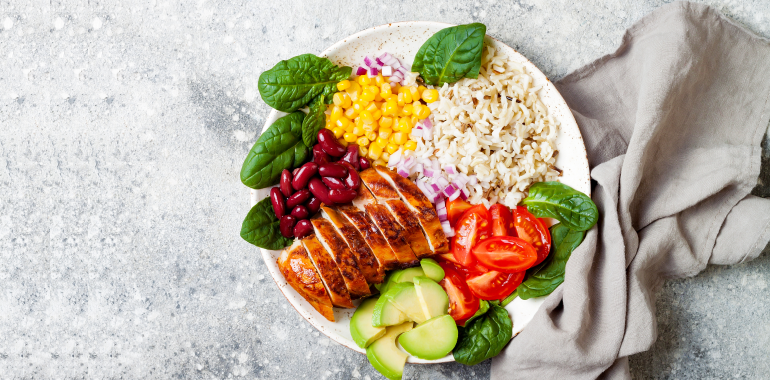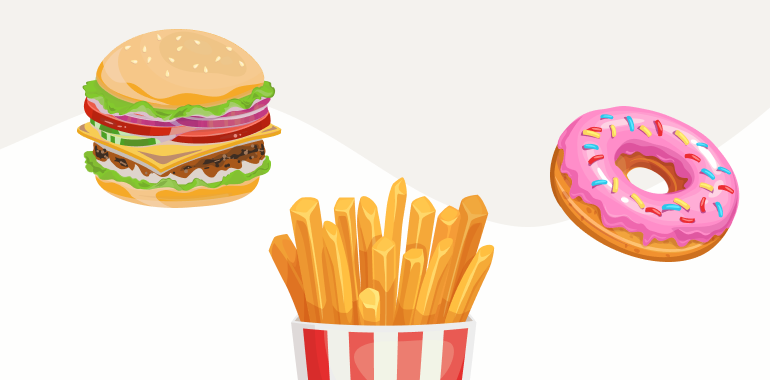Table Of Contents
Introduction: What is Dirty Keto Meals and How Does it Differ from a Traditional Keto Diet?
Dirty keto is a type of keto diet that focuses solely on macronutrient ratios while disregarding the quality of the foods consumed. This means that someone following a dirty keto diet might eat processed or unhealthy foods as long as they fit within their daily macronutrient targets.
On the other hand, traditional keto emphasizes whole, unprocessed foods with a focus on healthy fats, moderate protein, and minimal carbohydrates.
Traditional keto aims to achieve a state of ketosis, where the body burns fat for fuel instead of glucose. While dirty keto can also achieve ketosis, it may not provide the same health benefits as a traditional keto diet due to lower food choices.
The Basics of What is Clean Keto Diet
Clean keto is a type of ketogenic diet that focuses on consuming whole, unprocessed foods that are nutrient-dense and free from artificial ingredients. Clean keto emphasizes healthy fats, moderate protein, and minimal carbohydrates, with a focus on nutrient density and quality.
Clean keto is based on the principles of a traditional ketogenic diet, which aims to achieve a state of ketosis, where the body burns fat for fuel instead of glucose. However, unlike dirty keto, which allows for processed or unhealthy foods as long as they fit within daily macronutrient targets, clean keto prioritizes the quality of food choices.
Clean keto-friendly foods include avocados, nuts and seeds, olive oil, coconut oil, grass-fed meat and poultry, wild-caught fish, leafy greens, and other low-carb vegetables.

Clean Keto Recipes – The Foods You Need in Your Pantry & Fridge
If you’re following a clean keto diet, here are some foods to keep in your pantry and fridge:
Pantry:
- Nuts and seeds (almonds, walnuts, pecans, chia seeds, flaxseeds, etc.)
- Coconut oil, olive oil, avocado oil, and ghee
- Almond flour and coconut flour
- Canned tuna or salmon
- Bone broth or chicken broth
- Spices and herbs (garlic powder, onion powder, paprika, turmeric, etc.)
- Low-carb sweeteners (stevia, erythritol, or monk fruit)
Fridge:
- Leafy greens (spinach, kale, lettuce, etc.)
- Low-carb vegetables (broccoli, cauliflower, zucchini, asparagus, etc.)
- Avocado
- Grass-fed meat and poultry (beef, chicken, turkey, etc.)
- Wild-caught fish (salmon, tuna, etc.)
- Eggs
- Cheese (goat cheese, feta, parmesan, etc.)
Here is some clean keto food you can make with these ingredients:
1. Keto Broccoli and Cheese Soup: Saute broccoli and onions in ghee, then add chicken broth and simmer until tender. Puree the mixture and add cream and shredded cheddar cheese.
2. Keto Chicken and Broccoli Stir-Fry: Saute chicken in coconut oil, then add broccoli, bell peppers, and other veggies. Season with garlic and ginger, and finish with a splash of tamari sauce.
3. Keto Salmon and Avocado Salad: Combine flaked salmon with diced avocado, cherry tomatoes, and chopped spinach. Dress with olive oil and lemon juice, and sprinkle with chopped nuts.
4. Keto Cauliflower Rice and Ground Beef: Brown ground beef in a pan, then add cauliflower rice and cook until tender. Season with chili powder, cumin, and other spices, and top with shredded cheese.
5. Keto Chocolate Avocado Pudding: Blend ripe avocado, unsweetened cocoa powder, heavy cream, and low-carb sweetener until smooth. Chill in the fridge until set.
Also, read – How Much Sugar Can You Have On Keto
Lazy Keto vs Strict Keto for Optimum Weight Loss Results
Both lazy keto and strict keto can be effective for weight loss, but they differ in the level of attention paid to macronutrient intake and food quality.
- Lazy keto is a more relaxed approach to the ketogenic diet, where the focus is on limiting carbohydrate intake to achieve a state of ketosis rather than tracking all macronutrients.
With lazy keto, people often need to follow their total calories, protein, or fat intake and may rely on processed or low-carb convenience foods to stay within their carb limit. While lazy keto can be easier to follow and may still result in weight loss, it may provide different health benefits than a more nutrient-dense approach.
Strict keto, on the other hand, emphasizes whole, unprocessed foods and pays close attention to macronutrient ratios. It involves tracking and restricting both carbohydrates and total calories to achieve and maintain a state of ketosis.
- Strict keto can be more challenging to follow, but it may provide more fantastic weight loss results and improved health benefits due to the emphasis on nutrient-dense, whole foods.
Ultimately, the best approach will depend on an individual’s goals and lifestyle. For some, the more relaxed approach of lazy keto may be more sustainable and achievable, while others may benefit from the structure and discipline of strict keto.
Also, read – Not Losing Weight on Keto: What’s the Deal?
What Is the Difference Between Keto and Dirty Keto?
The difference between keto and dirty keto is primarily in the quality of consumed foods.
Keto, or the ketogenic diet, is a low-carbohydrate, high-fat diet emphasizing whole, unprocessed foods. The goal of keto is to achieve and maintain a state of ketosis, where the body burns fat for fuel instead of glucose.
- Keto-friendly foods include healthy fats such as avocados, nuts and seeds, olive oil, coconut oil, grass-fed meat and poultry, wild-caught fish, leafy greens, and other low-carb vegetables.
On the other hand, Dirty keto is a version of the ketogenic diet that focuses solely on macronutrient ratios without regard to the quality of the foods consumed.
- With dirty keto, people may eat processed or unhealthy foods as long as they fit within their daily macronutrient targets.
For example, someone following a dirty keto diet might eat fast food burgers without the bun or low-carb snacks that are high in artificial ingredients.
While clean and dirty keto can lead to weight loss and other health benefits, the long-term effects of consuming processed or unhealthy foods regularly still need to be better understood. Therefore, it is generally recommended to follow a ketogenic diet that emphasizes whole, nutrient-dense foods for optimal health and well-being.
Also, read – Paleo vs. Keto: Which Diet Will Work Best for you
5 general differences between a traditional or “clean” keto diet and a dirty keto diet:
Food quality
Clean keto prioritizes whole, unprocessed foods that are rich in nutrients, while dirty lazy keto food list focuses on meeting macro targets with less regard for food quality or nutrient density.
Carb sources
Clean keto typically sources carbs from low-glycemic vegetables and fruits, while dirty keto may allow for more high-glycemic carbs like processed snacks or fast food.
Fat sources
Both diets rely on healthy fats, but clean keto may prioritize monounsaturated and polyunsaturated fats, while dirty keto may depend more on saturated and trans fats.
Micronutrient content
Clean keto emphasizes getting a variety of vitamins and minerals from whole foods. In contrast, dirty keto may lead to nutrient deficiencies due to the limited range of foods consumed.
Health benefits
While both diets can lead to weight loss and other health benefits, clean keto may offer additional benefits like improved cardiovascular health, improved insulin sensitivity, and reduced inflammation due to the focus on nutrient-dense foods. Dirty keto may be less effective at promoting overall health due to the reliance on processed or unhealthy foods.
The Benefits of Following a Dirty Keto vs. Clean Keto
While both dirty keto and clean keto can lead to weight loss and other health benefits associated with a ketogenic diet, there are some potential benefits and drawbacks to each approach.
Benefits of dirty keto:
- Simplicity: With a more relaxed approach to the ketogenic diet, some people find it easier to stick to their dietary goals without having to track everything they eat.
- Flexibility: Dirty keto allows for more flexibility in food choices, which can be helpful for those who have limited access to healthy or unprocessed foods.
- Weight loss: People may still experience weight loss with dirty keto as long as they are able to maintain a caloric deficit and stay in a state of ketosis.
Benefits of clean keto:
- Nutrient-dense: A clean keto approach emphasizes whole, unprocessed foods that are high in nutrients, providing a wide range of health benefits and helping prevent nutrient deficiencies.
- Improved gut health: A clean keto approach typically includes high-fiber, nutrient-dense foods that can support a healthy gut microbiome and improve digestive function.
- Reduced inflammation: Eating a diet high in nutrient-dense foods can help reduce inflammation in the body and may reduce the risk of chronic diseases.
Drawbacks of dirty keto:
- Nutrient deficiencies: Relying on a processed or unhealthy dirty lazy keto food list may lead to nutrient deficiencies and may provide different health benefits than a more nutrient-dense approach.
- Increased inflammation: Processed and high-sugar foods can cause inflammation in the body, which may increase the risk of chronic diseases.
- Poor gut health: Processed and low-fiber foods can negatively impact gut health and digestive function, leading to digestive issues and other health problems.
Drawbacks of clean keto:
- More restrictive: Following a clean keto approach may require more planning and preparation to ensure adequate nutrient intake and macronutrient ratios are met.
- More expensive: Whole, unprocessed foods may be more costly and harder to access, making it harder for some people to follow a clean keto approach.
Overall, the best approach to a ketogenic diet will depend on an individual’s lifestyle, health goals, and personal preferences. It’s important to weigh each approach’s potential benefits and drawbacks and find the best fit for you.
Also, read – Is Broccoli Keto?
How Many Carbs a Day on Dirty Keto?
How many carbs a day on a dirty keto diet will depend on the individual’s preferences and lifestyle.
- Most dirty keto diets generally allow up to 65-75% of calories to come from dietary fats and 10-20% of calories to come from protein sources. This leaves just 15-25% of calories coming from carbohydrates ranging from 50g to 100g per day.
It is important to note that individuals following a dirty keto diet should focus on eating nutrient-dense foods free from preservatives and additives, as this type of approach tends to be higher in unhealthy processed foods.
Furthermore, increasing physical activity and an adequate water intake are also recommended for optimal health benefits. The number of carbs consumed on a dirty keto diet can vary depending on the individual’s goals and preferences, but it is typically around 20-50 grams of net carbs per day.
This range is similar to the recommended carb intake on a traditional ketogenic diet. However, on a dirty keto diet, the focus is solely on meeting the macro targets of the diet rather than the quality of the foods consumed.
This means that someone following a dirty keto diet may consume more processed or unhealthy foods to stay within their daily carb limit, which may not be optimal for overall health and well-being.
It’s important to note that the ideal amount of carbs for an individual may vary depending on their age, gender, activity level, and other health factors, so it’s always best to consult with a healthcare professional before making significant changes to your diet.
What are the Potential Risks of Following a Dirty Lazy Keto Food List?
Following a dirty keto diet can pose numerous risks to an individual’s health. One of the most prominent risks is that consuming highly unhealthy and processed foods could lead to a plethora of health issues, such as obesity, cardiovascular disease, and type II diabetes.
Additionally, individuals who choose to follow this dietary regimen may have deficiencies in essential minerals and nutrients, including calcium, magnesium, and vitamins, that could be obtained from healthier food options.
Furthermore, skipping the process of developing healthier eating habits could result in an increased risk of gaining weight back once someone stops following their current approach.
Ultimately, while a dirty keto diet may seem like a convenient way to lose weight fast, it is vital for individuals to contemplate the long-term effects before deciding to follow this plan. Following a dirty keto diet can pose several potential risks to your health and well-being, including:
- Nutrient deficiencies. Consuming a diet low in nutrient-dense foods and high in processed or unhealthy foods may lead to nutrient deficiencies and imbalances, which can negatively impact your health.
- Increased inflammation. A diet high in processed and sugary foods can cause inflammation in the body, which can lead to a higher risk of chronic diseases such as heart disease, cancer, and diabetes.
- Poor gut health. A diet high in processed foods and low in fiber can negatively impact gut health and digestive function, leading to digestive issues and other health problems.
- Weight loss plateaus. While dirty keto may help you lose weight in the short term, relying on processed or unhealthy foods can lead to weight loss plateaus or even weight gain in the long run.
- Long-term health risks. Consuming a diet that is high in processed or unhealthy foods can lead to long-term health risks such as heart disease, diabetes, and other chronic conditions.
Also, read – How to Lose Weight With Intuitive Eating?
Dirty Keto Recipes: What to Eat and Weight Loss
While there are no specific recipes for dirty keto, the basic principle is to focus on meeting your macro targets with foods that may not necessarily be considered “clean” or unprocessed. Here are some examples of foods that are typically consumed on a dirty keto diet:
- Fast food or processed meats such as bacon, sausage, and deli meats
- High-fat dairy products like cheese and heavy cream
- Low-carb snacks like pork rinds, beef jerky, and protein bars
- Low-carb alcoholic beverages like hard seltzer, beer, and wine
- High-fat condiments like mayonnaise, ranch dressing, and butter
When it comes to weight loss, consuming a diet high in processed or unhealthy foods may lead to weight loss in the short term, as long as you can maintain a caloric deficit and stay in a state of ketosis. However, it’s important to keep in mind that relying on processed or unhealthy foods for weight loss can lead to nutrient deficiencies and other health risks in the long run.
Also, read – How Long Does it Take to Enter Into Ketosis & What Are the Benefits?
Here are 10 recipe ideas that fit within a dirty keto approach:
1. Keto Cheeseburger Casserole: A one-pan dish made with ground beef, bacon, cheese, and various spices.
2. Keto Cauliflower Mac and Cheese: A low-carb twist on the classic mac and cheese made with cauliflower, heavy cream, and cheddar cheese.
3. Buffalo Chicken Dip: A creamy and spicy dip made with shredded chicken, cream cheese, buffalo sauce, and cheddar cheese.
4. Bacon-Wrapped Jalapeno Poppers: Jalapeno peppers stuffed with cream cheese and wrapped in bacon.
5. Keto Pizza: A low-carb pizza made with a cauliflower crust, topped with tomato sauce, cheese, and toppings of your choice.
6. Garlic Butter Steak Bites: Bite-sized pieces of steak seasoned with garlic butter and cooked to perfection.
7. Keto Fried Chicken: Chicken is coated in almond flour and spices, then fried in oil.
8. Low-Carb Bacon and Egg Cups: Baked eggs with a bacon “crust” that is perfect for meal prep or a quick breakfast.
9. Keto Taco Salad: A salad made with ground beef, avocado, cheese, and taco seasoning.
10. Keto Garlic Bread: Cheesy garlic bread made with almond flour and melted mozzarella cheese.
While these recipes can fit within a dirty keto approach, it’s still important to consume a variety of nutrient-dense foods to support overall health and well-being.

5 Dirty Keto Snacks to Stay Healthy
Dirty keto snacks can help people stay healthy while still allowing them the comfort of snacks they enjoy. Dirty keto is a great option for those who would like to remain on a low-carb, higher-fat diet but want to take advantage of the convenience and flavor of their favorite processed foods. Dirty keto snacks are low in carbohydrates but still high in protein and fats.
They also contain vitamins and minerals that help fuel your body’s natural processes and other health benefits. With dirty keto snacks, you can enjoy a variety of tasteful treats without sacrificing nutrition or wellness.
While following a dirty keto diet may prioritize meeting macro targets over food quality, choosing nutrient-dense snacks that provide health benefits is still important. Here are 5 snack ideas that fit within a dirty keto approach and can still support your overall health:
- Hard-boiled eggs
Eggs are a great source of protein and healthy fats, and hard-boiled eggs make for a convenient and portable snack.
- Mixed nuts
Nuts like almonds, walnuts, and macadamia nuts are high in healthy fats and can provide a satisfying crunch.
- Avocado
Avocado is an excellent source of healthy fats and fiber and can be eaten on its own or mashed into guacamole for a delicious snack.
- Beef jerky
Beef jerky is a high-protein snack that can provide a savory, salty flavor.
- Olives
Olives are a great source of healthy fats and can provide a briny, salty flavor that can be satisfying as a snack.
While these snacks can fit within a dirty keto approach, it’s still important to consume a variety of nutrient-dense foods to support overall health and well-being. Additionally, if you’re experiencing any adverse side effects or health issues while following a dirty keto diet, it may be worth considering a cleaner approach that prioritizes whole, unprocessed foods.
Conclusion
In conclusion, can you lose weight on dirty keto? So, dirty keto is a popular diet trend that has taken the health and wellness world by storm. From celebrity endorsements to outrageous weight loss claims, it’s easy to see the appeal of this trendy lifestyle.
While there is some evidence that this type of diet can promote weight loss on a short-term basis, the long-term health risks still need to be well known. As with any drastic turn from your everyday eating habits, it’s essential to understand what you’re getting into before making any decisions.
Before embarking on any new nutritional plan, check with your doctor or a registered dietitian to ensure it meets your individual needs and dietary requirements.
While the dirty keto diet may offer some benefits for those who are looking for quick results in their health journey, opt for a more balanced approach to meet your long-term nutritional goals.
Rebecca is a nurse, yoga teacher, and freelance copywriter with a passion for holistic health and self-development. When she’s not working in the health sector, she enjoys hiking the outdoors, cooking, and traveling.









